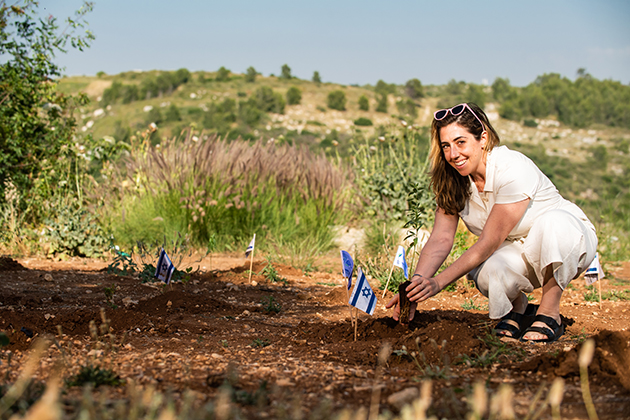Planting trees is a time-honored Jewish tradition rooted in history, Zionism, and environmental stewardship. For generations, trees have symbolized life, renewal, hope, and an unbreakable bond with the land of Israel.
Today, Jewish National Fund-USA proudly continues this legacy, making it easy to plant trees in Israel for celebrations, memorials, and meaningful moments through personalized physical tree certificates and e-Tree certificates.
Whether honoring a loved one, celebrating a milestone, or supporting Israel’s green future, planting a tree through Jewish National Fund-USA is a powerful act with lasting impact.
Why Trees in Israel?
Planting a tree is more than a symbol. It is a transformational act that secures your connection to the Jewish homeland. Since its founding in 1901, Jewish National Fund-USA has helped plant more than 260 million trees, reclaiming land, preventing desertification, conserving water, and strengthening Israel’s environment and communities.
When you plant a tree through Jewish National Fund-USA, you support:
- Environmental sustainability
- Fire prevention and forest management
- Soil conservation and agriculture
- Climate resilience and biodiversity
Meaningful Reasons to Plant a Tree in Israel
A Gift for Yourself
Planting a tree in Israel is a deeply personal way to invest in the land and live by your values. Your tree becomes part of a your living legacy while transforming arid landscapes into thriving forests.
Honor Special Occasions for Loved Ones
Whether for a birthday, anniversary, or any significant milestone, planting a tree in someone’s honor is a lasting tribute that reflects their importance to you. Jewish National Fund-USA's tree certificates come with a personalized message, making it a thoughtful and memorable gift that celebrates your loved ones while supporting Israel’s ecological future.
Celebrate Tu BiShvat
What better way is there to observe the Jewish New Year for the trees? When you plant, you support Jewish National Fund-USA's initiatives to support Israel’s agricultural infrastructure and innovations. Not only are you doing something good for the earth, but you are also sustaining the land of Israel through our ancient traditions.
Memorialize a Loved One
Planting a tree in memory of someone who has passed is a meaningful way to honor their life and legacy. Jewish National Fund-USA offers beautifully designed tree certificates that can be personalized to commemorate the life of a loved one. This act of remembrance creates a living memorial in Israel to your loved one.
Remember a Beloved Pet
Our pets hold a special place in our hearts, and planting a tree in their honor is a unique way to celebrate their companionship. Whether in celebration of their life or as a memorial, a tree certificate dedicated to a beloved pet symbolizes the joy and love they brought into your life.
Tree Certificates for Your Pet
Instant e-Tree Certificates: A Convenient Way to Give
Jewish National Fund-USA's e-Tree certificates makes planting trees in Israel effortless and accessible. With the click of a button, you can instantly purchase, customize, and send a tree certificate, perfect for last-minute gifts.
FAQs
How does my tree donation support Jewish National Fund-USA's projects?
All funds from tree certificates go directly to forestry and green initiatives, including planting trees in over 250,000 acres of land in support of Israel's environment.
How does planting trees with Jewish National Fund-USA connect to education and Israel?
With Jewish National Fund-USA's Plant Your Way to Israel program, you can create a page to fundraise, and we will reimburse you 50% of what you raise as a grant eligible toward any educational trip to Israel before the age of 30.
What makes Jewish National Fund-USA's environmental work unique?
We don't just plant trees. We implement multiple solutions to support the land and people of Israel, from water solutions to agriculture and beyond. Our comprehensive approach to these initiatives are called circles of impact, where each "circle" ripples outward to improve every aspect of life in Israel's North and South.
Aside from buying certificates, where can I help Jewish National Fund-USA's tree planting and green initiatives?
You can make the land of Israel greener by donating here!
Plant Trees in Israel Today
- Trees for Israel - Paper Certificate
- Memorial Tree in Israel
- Plant a Tree for Bat and Bar Mitzvahs
- Tree Certificates for Your Pet
- Wedding Gift Tree Certificates
- All Jewish National Fund-USA Trees
About Jewish National Fund-USA
Since 1901, Jewish National Fund-USA has been at the forefront of building a strong and vibrant future for the land and people of Israel. Our projects create life-saving infrastructure and self-sustaining opportunities in Israel’s North and South, from fortifying bomb shelters to building innovation hubs.
Our approach to providing this support is called circles of impact. Each circle represents one initiative that extends from addressing an individual need to improving quality of life across entire regions.
We are doing this by developing the most livable towns and cities in frontier communities to attract 800,000 new residents; creating a lifelong continuum of Zionist education through travel, learning, and leadership; and establishing the World Zionist Village in Be'er Sheva, a global hub for connection and peoplehood. As the most trusted name in Israel donations and with a four-star rating on Charity Navigator, we are the leading organization in bringing support to the people of Israel where they need it most.
We were there yesterday, are there today, and will be there tomorrow.


